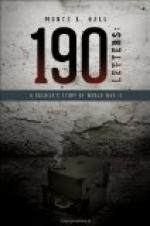spared? Yet I had something worth doing to do
in the world!’ Most touching is that sigh, even
more touching than the signs of greatness in his soul,
for it suddenly breathes an anguish long controlled.
It is a human weakness—our own weakness—that
is at last confessed, on the eve of a Passion, as in
the Divine example. At rare times such a question,
in the constant sight of death, in fatigue and weariness,
in the long distress of rain and mud, checks in him
the impulse of life and of spiritual desire. He
was himself the young plant of which he writes, growing,
creating fragrance and breaking into flower, sure
of God, feeling Him alive within itself. But
all at once it knows frost is coming and the threat
of unpitying things. What if the universe were
void, what if in the infinity of the exterior world
there were nothing, across the splendid vision, but
an insensate fatality? What if sacrifice itself
were also a delusion? ’Dark days have come
upon me, and nothingness seems the end of all, whereas
all that is in my being had assured me of the plenitude
of the universe.’ And he asks himself the
anxious question, ’Is it even sure that moral
effort bears any fruit?’ It is something like
abandonment by God. But that darkening of his
lights passes quickly away. He comes again to
the regions of tranquil thought, and leaves them thenceforward
only for the work in hand. ‘I hope,’
he writes, ’that when you think of me you will
have in mind all those who have left everything behind,
and how their nearest and dearest think of them only
in the past, and say of them, “We had once a
brother, who, many years ago, withdrew from this world."’
How strange is the serenity of these lofty thoughts,
how entirely detached from self and from all human
things is this spirit of contemplation. Two slight
traits give us signs: One night, on a battlefield
‘scattered with fragments of men’ and with
burning dwellings, under a starry sky, he makes his
bed in an excavation, and lies there watching the
crescent moon, and waits for dawn; now and again a
shell bursts, earth falls about him, and then silence
returns to the frozen soil: ’I have paid
the price, but I have had moments of solitude full
of God.’ Again, one evening, after five
days of horror (’we have no officers left—they
all died as brave men’), he suddenly comes upon
the body of a friend; ’a white body, splendid
under the moon. I lay down near him.’
In the quietness, by the side of the dead man, nothing
remains but beauty and peace.
* * * * *
These letters are to be anonymous, at least so long as any hope remains that he who was lost may return. It is enough to know that they were written by a Frenchman who, in love and faith, bore his part in the general effort, the common peril, glad to renounce himself in the pain and the devotion of his countrymen. By a happy fortune that he did not foresee when he left his clean solitude for the sweat, the servitude,




